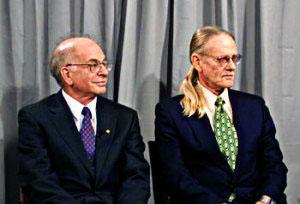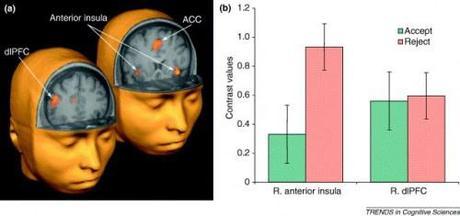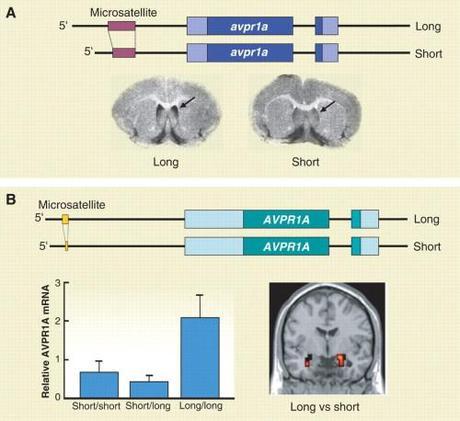
First, experimental economists and psychologists like nobel laureates Vernon L. Smith and Daniel Kahneman taught us that we aren’t economically rational–we’re influenced by biases and we use flawed heuristics (though often in very testable, repeatable ways).(1)
Then, Neuroeconomists showed that biology affects economic decisions–internasal oxytocin raises trust in risky exchanges, serum serotonin levels predict whether one will accept or reject an unfair offer from a stranger, and fMRIs demonstrate what brain systems are involved in our economic decision making.

Unfair offers in the ultimatum game conflict between emotional and cognitive more rational systems. (a) Areas in orange show greater activation following unfair as compared with fair offers–bilateral anterior insula and anterior cingulate cortex (ACC, right) and dorsolateral prefrontal cortex (dlPFC, left) (P<0.001). (b) Higher levels of right anterior insula activation predicts rejection of unfair offers. Sanfey (2006) Trends in Cognitive Sciences
Now, as The Boston Globe reports, genoeconomists are taking it further, confident they can use genetic variation to predict variation in financial behavior. (To which Princeton geneticist Leon Kruglyak tweeted “doubt it.”) If we’re struggling to find the genetic basis for extreme phenotypes that we know are heritable like schizophrenia, will we be able to find subtle variations that impact economic behavior?
At the same time, if we accept that a neuropeptide like oxytocin can influence economic decisions, why couldn’t genes coding for its pathway as well? One genoeconomics study measured the effect of polymorphisms in the receptor for Vassopressin, a neuropeptide related to oxytocin and thought responsible for pair-bonding in monogamous voles. Subjects with the short promoter polymorphism, which is associated with decreased vassopressin receptors in the hippocampus, showed significantly less altruism in experimental econs’ Dictator game.

Polymorphims in the promoter of Vassopressin Receptor AVPR-1a affect distribution in the brain both in voles (A) and in humans (B). Donaldson (2008) Science
Would the vasopressin receptor results replicate in cross-cultural experiments, with wealthy or poor subjects? These are questions which genoeconomics still needs to answer, and I will be interested in what they uncover. Perhaps our genes will predict our behavior when, as Kahneman might say, we’re thinking fast but not slow.
While I greatly value the importance of curiosity driven research, I don’t see many practical applications genoeconomics. Personally, I hope that genoeconomics gets a generation of quants to dip in the primordial pool of the human genome and converts them all into bioinformaticians or epidemiologists.
—————
1. By the way, Smith has talked publicly about his Asperger’s syndrome and how it has affected his work and teaching, and Kahneman’s latest book–Thinking Fast and Slow–is spectacular.
Further reading:
Genoeconomics: Promises and Caveats for a New Field- Arcadi Navarro (2009)
Neuroeconomics: cross-currents in research on decision-making - Sanfey et al. (2006)
Oxytocin, Vasopressin, and the Neurogenetics of Sociality – Zoe R. Donaldson, Larry Young (2008)







